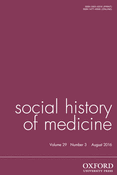-
Views
-
Cite
Cite
Julia Moses, Judith Rainhorn, ed., Santé et travail à la mine, XIX e– XXI e siècle, , Social History of Medicine, Volume 29, Issue 3, August 2016, Pages 645–647, https://doi.org/10.1093/shm/hkw025
Close - Share Icon Share
Extract
Émile Zola’s 1885 novel Germinal evokes the paradox of Northern France’s reliance on coal mining. As Zola’s title suggests, the industry gave rise to new opportunities: employment for the unemployed like the protagonist Étienne, warmth and energy. It also resulted in a fatal shadowside, contributing to his colleague Bonnemort’s illness, most likely silicosis, alongside individual accidents, large-scale catastrophes and more diffuse environmental damage. This duality inherent in the history of coal mining has led to a complex culture of remembering the industrial past. The early twenty-first century has witnessed the closure of mines across Europe, while UNESCO placed the Nord Pas de Calais Mining Basin on its ‘World Heritage List’ in 2012, declaring it an ‘Item of Outstanding Universal Value’. Perhaps due to its conflicting nature, the history of mining has also led to a rich historiography stretching from heroic accounts of miners and trade unionism to tragic tales of occupational illness and accidents. It is to the latter tradition that the volume under review seeks to contribute.




